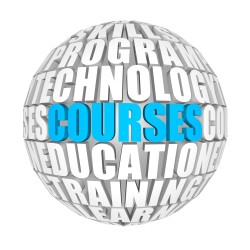Neurofeedback Courses
 A wide variety of courses exist to learn how to do neurofeedback. Whether you’re interested in adding neurofeedback to your practice, interested in more advanced knowledge, or interested in home use for you or your family, you can find a neurofeedback course that accommodates your needs.
A wide variety of courses exist to learn how to do neurofeedback. Whether you’re interested in adding neurofeedback to your practice, interested in more advanced knowledge, or interested in home use for you or your family, you can find a neurofeedback course that accommodates your needs.
With so many options, it can be difficult to choose a neurofeedback class that will meet your needs, work for your schedule, and provide an educational experience that will be most beneficial to your neurofeedback goals.
The Right Teacher
Having taken neurofeedback courses, I believe this is the most important criteria. After years in school, we know impressive credentials doesn’t always signify who is the best teacher. Learning neurofeedback requires both hands-on experience and technical skills. There are many new concepts and material to cover in a short time, and a skilled teacher is invaluable. Being good at neurofeedback or having a successful practice doesn’t necessarily mean someone is good at teaching.
Ways to decide if a teacher is a good fit for you include:
- Call and ask several questions about the course. You’re investing money and time, and a good instructor won’t mind taking a few minutes to answer several questions.
- See if the instructor has any videos on Youtube or another video host. Do you like the way they present material?
- Look for testimonials or ask the instructor to provide references so you can talk to others who have taken the course. A good instructor will support your efforts to ensure the best fit.
The Course First or the Equipment?
 The course is a critical first step. The foundation you get at the beginning is what you’ll build on going forward. Neurofeedback has a big learning curve, and choosing the best course makes a big difference in starting up.
The course is a critical first step. The foundation you get at the beginning is what you’ll build on going forward. Neurofeedback has a big learning curve, and choosing the best course makes a big difference in starting up.
There are big differences between available courses, the quality of teachers, the type of materials offered, models taught, whether they include qEEG concepts, etc. A lot of budding clinicians may ignore this selection process as they get caught up in the “neat” equipment.
Many neurofeedback classes are model-, software-, or equipment-specific. While there may be some crossover in applied knowledge between some systems, many are distinctly standalone. We also know of one introductory course that exposes students to a variety of different systems. While you want to ensure the course you take doesn’t significantly limit your choices in equipment, almost all equipment used in the field has pluses and minuses, and clinicians find success, whatever they use, or they wouldn’t remain in business.
What Materials Are Offered?
The comprehensiveness of the materials and manuals you’re provided are important. You won’t absorb all you need in a few days of instruction and will be glad to have notes and other materials to refer to. Learning really starts after the course. You need good materials to review, to help remember what was said, and to study. The course materials make a big difference.
While instructors are understandably unlikely to share their materials before you pay for the course, they should be willing to let you know what types of materials you’ll receive. Some general information about the material packet such as an overview of the manual or whether there are any CDs, DVDs, or web-based media are reasonable to ask.
Which Models Are Taught?
 Is the model flexible, or is it “our way is the best way”? Is it based on a diverse group of clinicians or driven by one person? Does it have a good scientific basis? This can be important when you try to explain it to colleagues, other healthcare professionals, and clients.
Is the model flexible, or is it “our way is the best way”? Is it based on a diverse group of clinicians or driven by one person? Does it have a good scientific basis? This can be important when you try to explain it to colleagues, other healthcare professionals, and clients.
Does it cover and allow for qEEG’s brain mapping? Some models don’t think qEEGs matter. Many others in the field do and feel it’s important additional information about how to best help a client. It can be helpful to talk with several clinicians and find out which models they use and why before making a final decision about the neurofeedback course you want to take.
BCIA Certification or CEUs?
Is your goal to pass the BCIA exam or to take the best course to learn how to do neurofeedback? A course focused on helping you pass BCIA isn’t going to be the best course for learning hands-on neurofeedback. Certification is more academic, and is not necessarily designed to help you in a clinical practice. On the other hand, there are a lot of foundation materials for BCIA that are useful. You can do neurofeedback without getting BCIA certified. The certification is about meeting standards and having a certain amount of knowledge, not doing hands-on neurofeedback.
First and foremost, if your goal is to practice neurofeedback, we suggest picking the best course for learning neurofeedback. If practical, try to pick one that mixes clinical practice time with theory and gives you BCIA hours. Don’t simply pick a BCIA course and think you’ve picked the right course. There are VERY limited course offerings that do a really good job of hands-on practice and theory.
If CEUs are important, whether or not a neurofeedback class qualifies is worth considering. I personally don’t believe it should be the “make it or break it” decision if a course sounds ideal in every other capacity. I also understand it can be a factor when there are limited resources and time available to be away from your business.
Do You Learn Anything About the Business of Neurofeedback?
Running a neurofeedback business may be different than the type of business you’re used to. Is there any time dedicated to discussing how you run the business mechanics of your neurofeedback practice?
Obviously hands-on experience and technical skill are more important, and a short time spent on aspects of neurofeedback as a business can help you get started more quickly. Experienced clinicians have learned some tricks to help their business run smoothly, and those can be invaluable tips as you’re starting out.
Learning After the Course?
 Since most of your learning will happen after your initial course, it makes some sense to consider a strategy for ongoing support.
Since most of your learning will happen after your initial course, it makes some sense to consider a strategy for ongoing support.
Do you just find a local clinician and ask for help? Is there any formal way to share and get clinical support? Is there an upcoming conference? Networks of support are available, but do they work or create confusion? Can you get all the help you need online?
Many courses have no follow-up in place, nor do all instructors have follow-up Mentor Programs in place for ongoing education. Especially in the beginning, many cases benefit from some in-depth and detailed discussion with someone more experienced. Mentoring is one answer, and it’s not the only one.
Many bright, competent clinicians become frustrated when they get started. They’ve been told about all the wonderful effects of neurofeedback, and they aren’t getting the same results. What then? Eventually, they find other people, better teachers, and better mentors – people who can help them learn to adapt neurofeedback to their clients’ situations more effectively.

